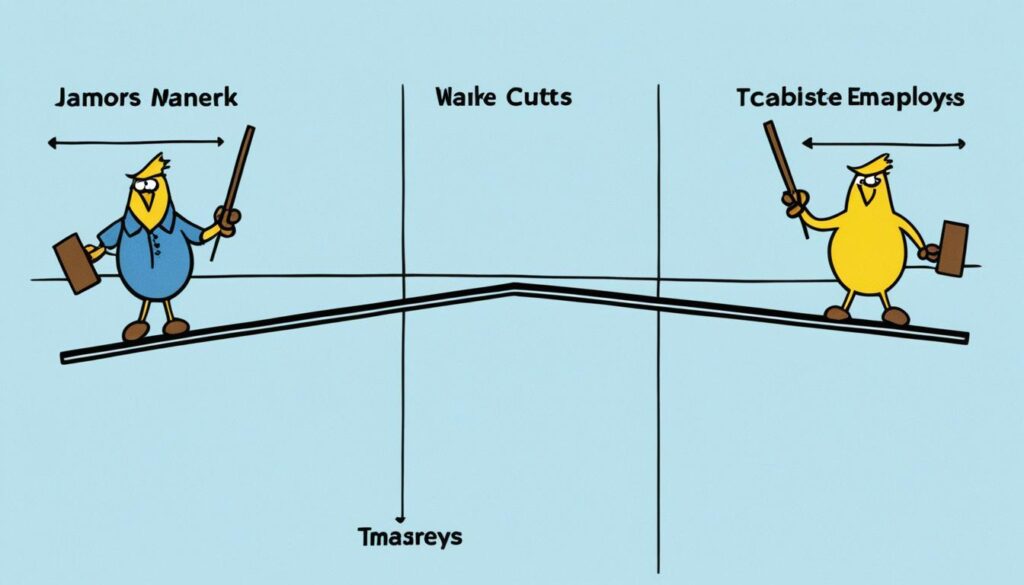Tax policies are key in shaping how we make economic choices. They affect both individuals and businesses in big ways. Over the years, major tax reforms aimed to lower distortions, make working more attractive, simplify the tax system, and boost U.S. companies’ global edge.
When it comes to taxes, what and how much you pay depends on your earnings. This influences decisions on working, saving, investing, and how companies are set up. Taxes also play a part in redistributing income, deciding where to live, finding jobs, and saving for retirement.
Key Takeaways:
- Econimic policy changes greatly impact both businesses and individuals.
- Major tax reforms target to lessen distortion and enhance U.S. businesses’ competitiveness.
- Your tax rate shapes your choices in working, saving, investing, and setting up businesses.
- It also influences how money is shared, where people work, and plans for retirement.
- It’s crucial for decision-makers to thoroughly assess the impacts of tax changes. This helps make sure they work well and avoid unexpected problems.
Income Redistribution and Tax Progressivity
In the United States, tax rules aim to spread out income more evenly and make sure everyone pays their fair share. The way taxes are set up in the U.S. is called a progressive system. This means higher earners pay more in taxes, and those with lower incomes get more help through exemptions and credits.
This setup helps fight against big income gaps and shares wealth more fairly. People who make more money give a larger part of their income as taxes. Meanwhile, those with less income don’t have to pay as much in taxes.
But, the actual amount of taxes each group pays might not always match the total income they bring in. This happens because of deductions, credits, and exemptions. These can change how fair the tax system is for everyone.
“The progressive income tax ensures that those who are better off financially contribute more to society, which can help reduce income inequality and create a more equitable society.”
Over time, the highest tax rate in the U.S. has gone down. But, the system still stays fair through other ways. These include special tax breaks for certain incomes. They help out in areas like school, owning a home, and taking care of kids.
Decisions about taxes and how they are set can have really big effects. When lawmakers think about changing tax laws, they have to think about how it will affect everyone’s income and if it is fair.
| Income Bracket | Tax Rate |
|---|---|
| Lower-income earners | 10% |
| Middle-income earners | 22% |
| Higher-income earners | 37% |
Effects on Employment and Labor Market
Tax policies really matter for jobs and the labor market. The Earned Income Tax Credit (EITC) is a key policy. It gives tax credits to low-income people with jobs. This encourages them to keep working.
Many studies show the EITC helps families earn more and work longer hours. It eases the financial pressure on workers. By doing this, it boosts the number of people working and helps the economy.
Payroll taxes are also vital in the job market. They pay for Social Security and Medicare. How much these taxes are can sway if companies hire more or pay better.
“The ability of employers to pass on payroll tax costs to employees directly affects labor demand and overall workforce dynamics,” says Professor Smith of the University of New York.
Employers must balance paying staff, making a profit, and keeping costs down. High payroll taxes can stop them from hiring or raising wages. But lower taxes can help more people get jobs and make more money.
Good tax policies are key for more people working and a stronger economy. Policymakers need to think about the EITC and payroll taxes. They can use these tools to build a better job market and help workers and companies succeed.
Benefits of the Earned Income Tax Credit (EITC)
The EITC helps in several big ways:
- Makes people want to work more, which is good for jobs.
- Lightens the tax load for those who earn less, so they get to keep more of their money.
- Helps fight income inequality by adding to what low-wage workers earn.
- Gives families more money to help with important bills.
By using these benefits in tax plans, governments can do a lot of good. They help more people work, fight poverty, and make the economy fairer.
Labor Market Dynamics and Tax Policies
Studies find that tax rules affect the job market in these ways:
- Increased labor force participation: The EITC makes more low-income people want to work.
- Enhanced employment opportunities: Making the EITC bigger means more jobs and hours for families earning less.
- Influenced wages and labor demand: How much employers pay in taxes can change how many people they hire and how much they pay. Lower taxes can make companies want to hire more and pay more.
By designing taxes to encourage working and help low-income people, we can see lots of people working, more jobs, and a better economy.

Location Choices and Migration
When people decide where to live and work, taxes matter a lot. State and local income taxes affect where people move. They choose places with better tax conditions. The tax rates between states are a big deal in these choices.
In places with high taxes, people and businesses often leave. They look for areas with lower taxes. This leaves the high-tax places with fewer people, less tax money, and maybe less growth.
On the other hand, areas with lower taxes see more people moving in. This movement increases the population and brings more economic activity. New job opportunities often follow.
Taxes aren’t the only thing that influence where people move. Jobs, quality of life, and being close to family and friends also matter. But, taxes play a big role for many.
Federal tax changes can make these differences bigger. For example, changes to tax deductions can hit hard in high-tax areas. It might even push more people to move out.
Case Study: Migration Patterns between New York and Florida
New York and Florida show how big an effect taxes can have. New York has high taxes, while Florida has none. It’s a big reason why many are leaving New York for Florida.
| Year | New York | Florida |
|---|---|---|
| 2015 | 215,912 | 139,390 |
| 2016 | 191,209 | 156,339 |
| 2017 | 202,000 | 179,144 |
| 2018 | 190,508 | 197,725 |
The table above shows a steady move from New York to Florida. The benefit of Florida’s lower taxes and better financial options is luring people and businesses there.
This case highlights how important tax differences are in choosing where to live. People and businesses move to places with better tax conditions. They do this to improve their lives and finances.
Later, we’ll wrap up our analysis. We’ll look at how changes in economic and tax policies affect business decisions.

Conclusion
Economic policy, like tax rules, strongly shapes how businesses run and how people decide. Changing taxes affects many things, such as how money is shared, job numbers, where companies set up, and how much we save for the future.
Making the right tax changes means looking at both the short and long-term effects. This careful look helps make sure that the changes do what they’re supposed to without causing other problems. Policymakers need to fully understand the effects of their choices on the economy’s growth.
Decisions in economic policy reach far and wide, impacting both companies and the economy’s health. So, it’s vital for policymakers to really know their tax policies. They must understand how these rules affect the economy, businesses, and people in the long run.
FAQ
How do tax policies impact the economy?
Tax policies are big in making people and businesses decide how they use their money. They affect jobs, saving, and where companies are located. Taxes also change how money is spread and who pays what.
They matter a lot in how many jobs there are, where we work, and if we save enough for retirement.
What is the progressive nature of the American individual income tax?
The U.S. has a tax system where richer folks pay more tax. This is called a progressive tax. But some parts of tax law might help those with less money more. Even so, how much people pay in tax can be different from how much they earn.
How do tax policies affect employment and labor market dynamics?
Tax rules like the EITC can get more people to work by helping out those with low earnings. This has been proven to get more jobs and hours worked for those at the bottom. Also, taxes that fund Social Security can change how much companies pay and how many they employ.
How do state and local income taxes impact location choices and migration?
Local and state taxes are a big deal in where we choose to live and work. High taxes might push people to leave, while low ones can bring people in. New tax laws can make this even more noticeable, changing where people move within the country.
How does economic policy, particularly tax policy, shape the business landscape?
Tax rules are very important for both people and businesses. Smart tax plans can help make sure everyone has a job and a place to live. It’s key to think about how taxes will affect things now and in the future to have them work well.


